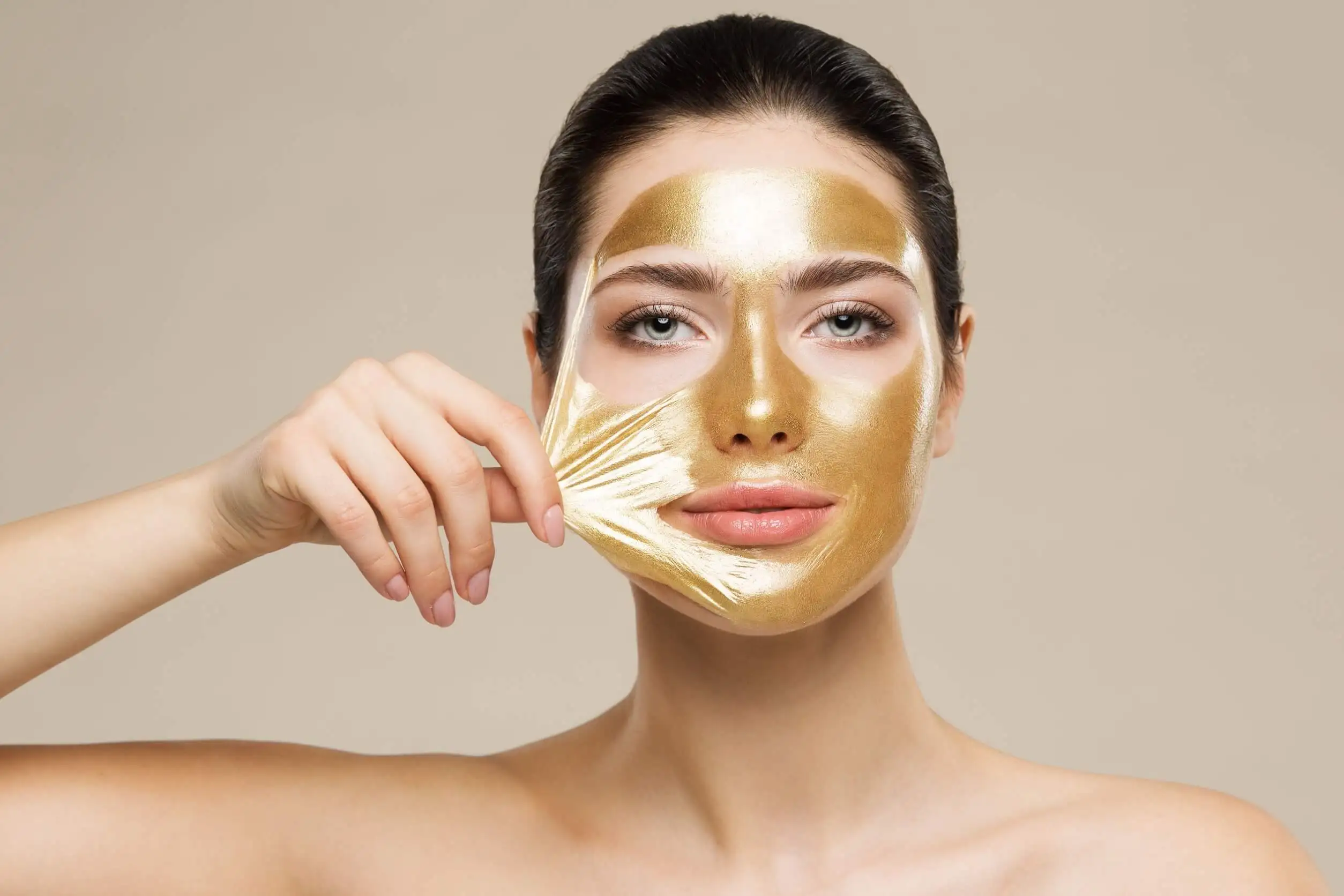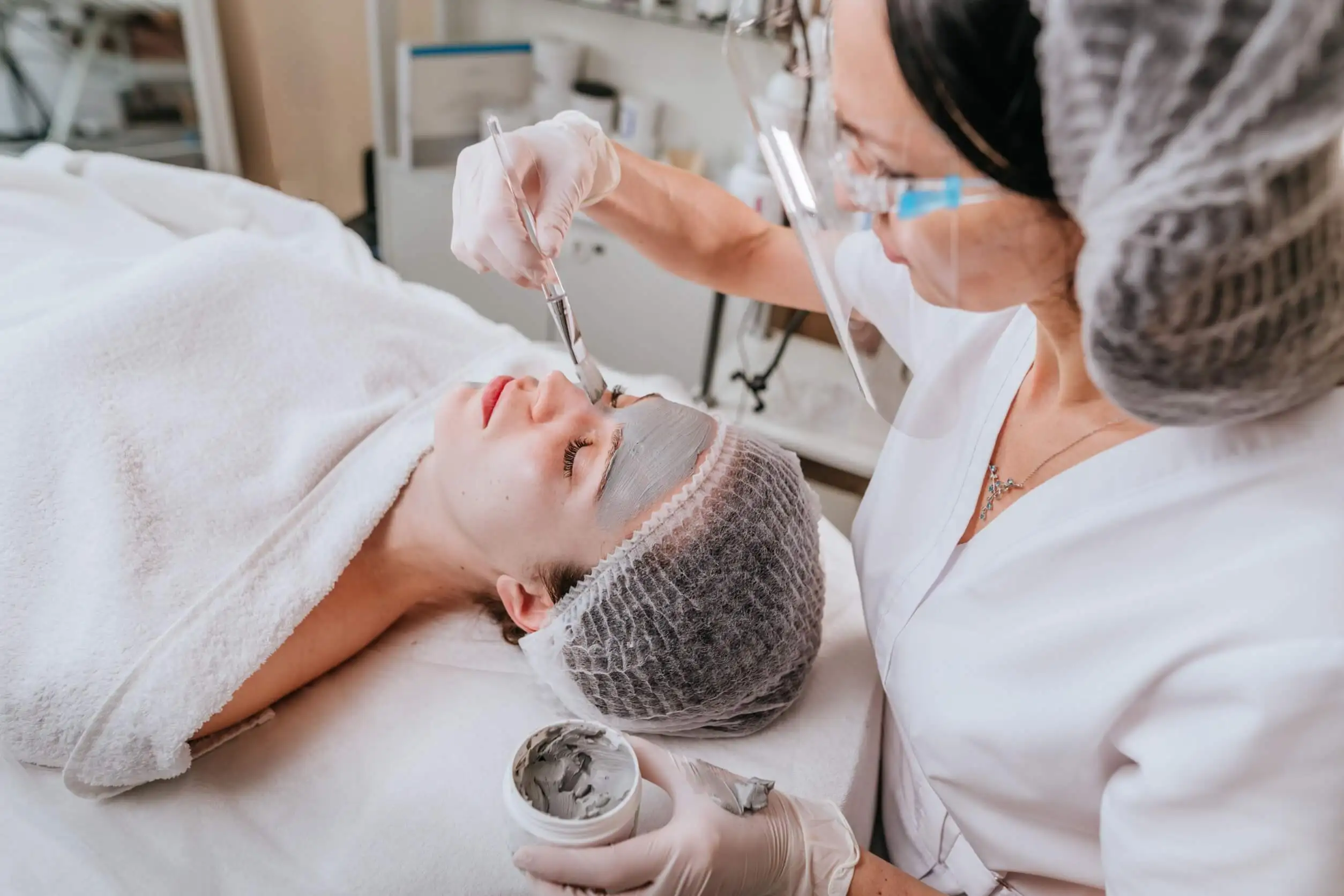What is the Skin Barrier and How Can You Take Care of It?


Reviewed and approved by the nurse Leidy Mora Molina
The skin barrier protects our skin against free radicals that damage the natural production of elastin and collagen, which are largely responsible for the skin’s good appearance. So, for this wall to do its job, it’s important to lead a healthy lifestyle and take care of your skin’s needs. We’ll show you how to do this in this article.
What is the skin barrier?

The skin barrier (CB) is one of the skin’s defensive lines, as stated in an article in the Pascua Dermatological Center Magazine. Thus, it blocks the passage of harmful elements from the environment.
So, the resistance and hardness of this barrier corresponds mainly to the corneocytes united by a lipidic plate with natural moisturizers, keratin, ceramides, and fatty acids, with an acid pH between 4.5 and 5.5.
Precisely, this composition prevents dermatological alterations, as well as the attack of biological agents or irritative reactions. Furthermore, other tasks of the BC are related to protection against toxins, UV rays, and infections.
Damage that the skin barrier could suffer
Dermatología Venezolana points out that the BC could be affected by inborn errors of metabolism or by acquired diseases, damaging the permeability and quality of the skin. Also, wounds, climate, and over-washing can deteriorate the skin barrier, as well as the following factors:
- Allergens
- Aging
- Hot showers
- Anxiety and stress
- Sleep disorders
- Consumption of steroid medications
Similarly, the epidermal layer resents the rubbing of some textiles and the continuous application of cosmetics unsuitable for certain conditions. So, it’s a mistake to perform beauty rituals with any substance without considering that all types of skin have different requirements.
Furthermore, when the skin barrier doesn’t work properly, symptoms such as flaking, dryness, and itching begin to appear. In addition, the skin begins to look wrinkled and discolored, and people are more prone to viral or bacterial infections.
For example, one of the common diagnoses is atopic dermatitis; according to the National Eczema Association, the patient evidences inflammation, redness, pain, and thickening.
We think you may also like to read this article: Dyshidrotic Eczema: Everything You Need to Know
Ways to protect the skin barrier
By protecting the skin, you defend the integrity, softness, and strength of the skin barrier – even in the future. So, how can you preserve the armor of this layer? We’re going to tell you below.
Opt for skincare with dermatological approval
Don’t complicate your skin care with dozens of products without asking your dermatologist which ones are suitable. Viral cosmetics on social networks promise to restore radiance, but they’re not suitable for everyone. It costs less and benefits more to treat the dermis with what it really needs.
The American Academy of Dermatology suggests developing a simple routine based on cleansing, moisturizing, and sun protection, taking into account the characteristics of dry, sensitive, oily, or combination skin.
Moisturize and hydrate your skin
The effectiveness of the skin barrier depends largely on cleansing and the supply of moisturizers that prevent water evaporation. This is highlighted in the magazine Folia Dermatológica Peruana, emphasizing the importance of covering the stratum corneum with mineral oils and other ingredients such as petrolatum and lanolin.
Try to moisturize with water-based substances containing glycerin and lactic acid. If you have skin disorders, you may need emollients; creams with ceramides also support the structure and function of the barrier. Hyaluronic acid formulas are powerful moisturizers that penetrate deep down, repairing damage from oxidative stress, photoaging, and wrinkles.
Exfoliate with the right acids

Exfoliation is beneficial if applied at least 15 days apart. You can do it with natural preparations or opt forchemical exfoliants, which often use alpha hydroxy acids (AHA) and beta hydroxy acids (BHA).
The Spanish Academy of Dermatology and Venereology (AEDV) points out that both ingredients dilute the intracellular cement, cleaning the deepest part of the skin. It’s best that the chemical procedures are carried out by professionals.
However, this type of exfoliant is also used for cosmetic purposes at home; the key is to determine with the dermatologist the acids according to the objective and the doses, as the AEDV points out that even the lowest doses could have adverse effects on sensitive skin. There’s a group of frequently prescribed AHAs and BHAs.
- Salicylic acid: In addition to exfoliants, it can be found in creams, lotions, gels, and patches to cleanse the skin. Furthermore, it’s useful for blemishes, imperfection, and acne.
- Mandelic: When mixed with glycolic, it has bactericidal and bacteriostatic activity, according to research published by the Brazilian Journal of Scientific Aesthetics.
- Glycolic: This is ideal for photo-aged skin. An experiment on patients who used this acid for 6 months revealed that its topical administration improved skin texture and color. When combined with salicylic acid, it acts as a peeling that promotes dermal stimulation.
Eating healthy benefits your skin
A healthy diet highly benefits the appearance of the skin. Clinical Nutrition and Hospital Dietetics emphasizes that some dietary modifications reinforce the treatment and prevention of skin conditions such as psoriasis, acne, and dermatosis associated with obesity and skin aging.
So, what should you add to your diet? For example, whole foods and antioxidants, healthy fats, and drinking plenty of water. The menu also contemplates meals with the following ingredients:
- Grains
- Nuts
- Fish
- Leafy green vegetables
- Yellow and orange fruits
Like this article? Read about why you should: Eat Five Fruits and Vegetables a Day to Live Longer
Protect yourself from the sun
Solar radiation is one of the main enemies of the skin barrier, as it accelerates dermal aging and causes hyperpigmentation, and increases the risk of skin cancer.
Thus, avoid the sun between 10 a.m. and 4 p.m., and wear long sleeves and hats. Likewise, it’s essential to apply sunscreen with a high Sun Protection Factor (SPF) daily and reapply every 4 hours maximum.
A study published by Community Pharmacists concluded that cleansing the skin with light surfactants and using a broad SPF prevents photoaging and photocarcinogenesis; in addition, this is beneficial for the skin wall.
Keep your stress under control
Hormonal imbalances caused by stress undermine the skin barrier – for example, they often cause acne. In fact, an issue of Dermatología Peruana notes that the face is the area most affected by outbreaks, given the higher concentration of sebaceous glands. Thus, the diagnosis could have psychological effects and form a vicious circle that worsens the condition.
Although it may seem complicated, due to the impact on personal appearance, it’s essential to manage emotional stress in order not to aggravate the lesions or the stratum corneum.
Knowing about pH
As the Dermal Evaluation Center comments, the superficial pH of the skin regulates the stability of the epidermal barrier and is responsible for the secretion of the lamellar bodies, relevant in the formation of the skin barrier.
Furthermore, in the case of the products you provide to the skin, it’s recommended that the pH ranges between 4.0 and 5.0 to safeguard a healthy level to protect against ichthyosis, acne, dermatitis, or infections.
Try vegetable oils
Vegetable essential oils are a relief against common skin barrier conditions. Furthermore, there are preparations with antioxidant, antibacterial, and anti-inflammatory effects.
Moreover, you can apply them directly or by blending them with body lotions and creams, which enhance moisture retention. So, here are some beneficial oils for massaging the skin:
- Coconut oil
- Argan oil
- Sunflower oil
- Almond oil
- Rose hip oil
Avoid smoking
The Healthy Skin Foundation warns about the damage of nicotine on the fibers and texture of the skin; in addition, it stains the fingers that hold the cigarette. Smokers may also experience narrowing of blood vessels, dryness, and decreased collagen and elastin.
Smoking also increases a person’s risk of both lung and skin cancer.
What to do if you notice damage to your skin barrier
Finally, if you notice any adverse reactions after continued application of a product or symptoms persist that could be related to alterations of the skin barrier. Thus, the first step is to discontinue the formulas that may be causing the effects. Certainly, these signs reveal the skin’s rejection of the composition of such substances.
Finally, the next step is to visit a dermatologist. Only then will you know which treatments or cosmetics compromise the structure of the stratum corneum and which is the way to keep your epidermis healthy, hydrated, and protected.
All cited sources were thoroughly reviewed by our team to ensure their quality, reliability, currency, and validity. The bibliography of this article was considered reliable and of academic or scientific accuracy.
- Ácido salicílico. Medline Plus. Biblioteca Nacional de Medicina. Estados Unidos; 2016. https://medlineplus.gov/spanish/druginfo/meds/a607072-es.html#:~:text=El%20%C3%A1cido%20salic%C3%ADlico%20t%C3%B3pico%20alivia,facilitar%20su%20desprendimiento%20o%20eliminaci%C3%B3n
- Aizpun Ponzan M. Tabaco y cuidado de la piel. Fundación Piel Sana. España; 2016. https://aedv.fundacionpielsana.es/prevencion/tabaco-y-cuidado-de-la-piel/
- Alvarado Delgadillo A, Santamaría González V. Flora cutánea como protección y barrera de la piel normal. Revista del Centro Dermatológico Pascua. Vol. 11. Núm. 1. México; 2002. https://www.medigraphic.com/pdfs/derma/cd-2002/cd021e.pdf
- Andreoni W, Mendonça O, Mêne R, Moraes P. Peelings químicos combinados. Dermatología quirúrgica y estética. Vol. 3. Núm. 1. pp. 1-10. Brasil; 2013. https://www.mendeley.com/catalogue/a285008f-9476-33eb-95df-4d34e7bf204e/?utm_source=desktop&utm_medium=1.19.4&utm_campaign=open_catalog&userDocumentId=%7B5497c472-b0df-4868-9563-7144c57cf8ae%7D
- Azulay R, Cotta Pereira G, Hofmeister H, Miki C, Nunes L. Ácido glicólico en el envejecimiento cutáneo. Análes Brasileños de Dermatología. Vol. 71. Núm. 1. pp. 7-11. Brasil; 1996. https://www.mendeley.com/catalogue/0b2dc77d-a423-3377-a975-4f5ca48ee56c/?utm_source=desktop&utm_medium=1.19.4&utm_campaign=open_catalog&userDocumentId=%7Bd4376a00-a7b5-4145-bc88-6bae654f1055%7D
- Brillid K, Galbis M, Ordóñez J, Tejedor N. Recomendaciones higiénicas que previenen los daños derivados del exposoma (exposición solar, contaminación, tabaquismo, nutrición, estrés y falta de sueño. Farmacéuticos Comunitarios. 2022. https://www.farmaceuticoscomunitarios.org/es/journal-article/recomendaciones-higienicas-que-previenen-danos-derivados-del-exposoma-exposicion
- Bühl B, Bühl C, Miranda Ethur, Sinigaglia G, Zanatta L. Actividad antimicrobiana del ácido mandélico y del ácido glicólico frente a la bacteria Propionibacterium acnes. Revista Brasilera de Estética Científica. Vol. 1. Núm. 1. Brasil; 2020. https://www.mendeley.com/catalogue/45c7a4fa-9d97-34e6-9dae-6f93cce3178e/?utm_source=desktop&utm_medium=1.19.4&utm_campaign=open_catalog&userDocumentId=%7B9631cf6e-1cd9-43b1-99e8-70555aa1c30f%7D
- Cardona R, Gil Castaño G. Emolientes: beneficios, elementos clave y aplicación clínica. Revista Alergia. Vol. 67. Núm. 2. pp. 128-141. México; 2020. https://www.mendeley.com/catalogue/64e34250-1b68-3712-9f20-87133cf7d4ea/?utm_source=desktop&utm_medium=1.19.4&utm_campaign=open_catalog&userDocumentId=%7Bc5c07605-5d74-416c-a674-ba813206db6d%7D
- Crizón Díaz DP, Franco Correa VE. Barrera cutánea y productos reparadores de la misma. PIEL. Formación continuada en dermatología. Vol. 33. Núm. 9. pp. 596-601. España; 2018. https://www.sciencedirect.com/sdfe/pdf/download/eid/1-s2.0-S021392511830203X/first-page-pdf
- Cuidado de la piel con un presupuesto. Academia Americana de Dermatología. Estados Unidos. https://www.aad.org/public/everyday-care/skin-care-basics/care/skin-care-budget
- Dermatitis atópica. Asociación Nacional de Eczema. Estados Unidos. https://nationaleczema.org/eczema/types-of-eczema/atopic-dermatitis/
- Escalante Jibaja E. Acné y Estrés. Dermatología Peruana. Vol. 17. Núm. 1. Perú; 2007. https://sisbib.unmsm.edu.pe/bVrevistas/dermatologia/v17_n1/pdf/a07v17n1.pdf
- Marcano M, González F. Barrera Cutánea. Dermatología Venezolana. Vol. 44. Núm. 2. Venezuela; 2006. https://revista.svderma.org/index.php/ojs/article/viewFile/156/156
- Orlandi MC. Piel sana y manto ácido. Folia Dermatológica Peruana. Vol. 15. Núm. 5. pp. 121-124. Perú; 2004. http://www.cidermperu.org/php/folia/pdf/f0078.pdf
- pH cutáneo. Centro de Evaluaciones Dérmicas. Argentina. https://www.cedlabs.com/publicaciones/detalle/7-ph-cutaneo#:~:text=El%20pH%20de%20la%20superficie,la%20activaci%C3%B3n%20de%20hidrolasas%20lip%C3%ADdicas
- Puerto Caballero L, Tejero García P. Alimentación y nutrición: repercusión en la salud y la belleza de la piel. Nutrición Clínica y Dietética Hospitalaria. Vol. 33. Núm. 2. pp. 55-65. España; 2013. https://www.mendeley.com/catalogue/d5f0e04f-babd-3509-b639-f5c35d4a489e/?utm_source=desktop&utm_medium=1.19.4&utm_campaign=open_catalog&userDocumentId=%7Bdfc049d8-7c45-4409-8b00-fd2e608a5617%7D
- Sánchez Viera M. Renovar la piel mediante exfoliación. Academia Española de Dermatología y Venereología. España; 2016. https://aedv.fundacionpielsana.es/estetica/renovar-la-piel-mediante-exfoliacion/
This text is provided for informational purposes only and does not replace consultation with a professional. If in doubt, consult your specialist.








